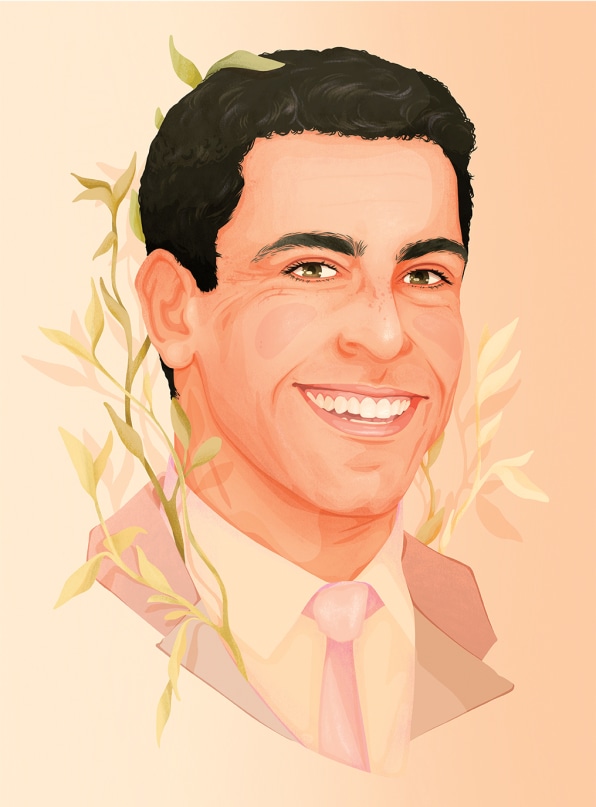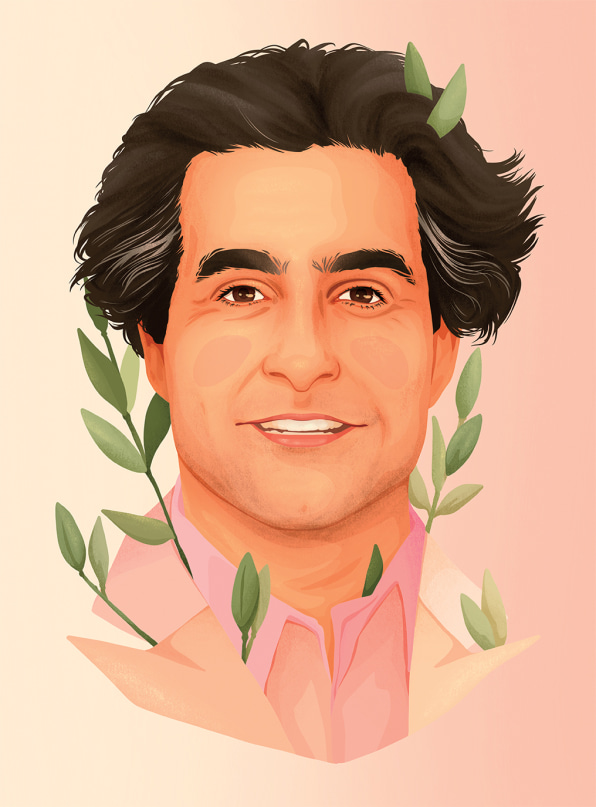This story is part of State of Mind, a special package covering mental health at work. Fast Company also has an excerpt of Bonobos cofounder Andy Dunn’s new memoir, Burn Rate, about growing his company while having bipolar disorder, and looks at how Alicia Keys is expanding her business interests mindfully.
High-profile athletes and entertainers have increasingly been speaking out about their struggles with mental well-being in recent years. Very few business leaders have done the same. There’s a simple reason for that: There’s still a stigma associated with revealing such seeming vulnerability at work. But with burnout, anxiety, and depression among workers hitting record levels—according to a 2021 report from mental health consultancy Mind Share Partners, three-quarters of full-time U.S. workers reported experiencing at least one symptom of a mental health condition in the past year, up from 59% in 2019—we’re seeing signs of change. Companies are making mental health benefits more accessible and starting to have substantive discussions about how company culture affects employees’ sense of well-being. Lawmakers are wrestling with how to ensure that mental health and physical health are treated equally by employers and insurers. And business leaders are beginning to speak more openly about their own experiences.

To talk about these issues, Fast Company brought together CBS Sunday Morning anchor Jane Pauley, who has been open about having bipolar disorder; entrepreneurs Andy Dunn and Paul English, who have shared their own struggles with mental illness; and mental health and well-being advocates Alicia Keys and Amit Paley, CEO of the Trevor Project.
Jane Pauley: Two years of working from home—either in isolation or with toddlers or teenagers underfoot—has been very difficult. The sense of anxiety and grief has been unrelenting. It seems as if everyone is willing to talk about mental health more openly.

Alicia Keys: So many of us are going through [mental wellness issues] because the world we’re living in is unrelenting. At some point, we have to figure out how we are relating to ourselves within that.
Pauley: Two days ago, my colleague asked me, “How are you?” I told them that I’ve not been doing that great. I’m like the millions of Americans who have kind of slogged through the last two years. There has been depression and there has been some anxiety. And yet [until then] I hadn’t mentioned it to anybody at work. It felt empowering. It felt liberating.

Amit Paley: It is so important that people know that it is okay not to be okay. When we’re not feeling that way, it’s important to talk about it and share that with other people.
Paul English: Secrecy and shame are the enemy of healing. I was diagnosed as being bipolar at age 25. Initially, I started talking to a few people, like one sibling, one friend, one person at work. I wanted someone from each of those three elements of my life to know what’s going on so they could keep an eye on me and help me when I was going off the deep end, on the depressive side, or flip side, on the manic end. I had those people watching out for me. Over time, over the years, I started to become open to more people.

Andy Dunn: In the year 2000, I was spiraling. It was the turn of the millennium. I remember seeing a video of people praying on TV for the arrival of the Messiah. And I came to the conclusion—through a mixture of drinking and my unraveling mental state—that [the Messiah] was me. I ended up [having a manic episode and] spending a week in a hospital and going on medication. I was diagnosed with bipolar disorder type 1. I couldn’t process it. I felt so much humiliation and shame over the manic episode that to acknowledge what had happened would be to acknowledge the diagnosis. I decided, “You know what? It’s not true. It can’t be true.” I just decided everything was normal.
I was symptom-free for eight years. Then in the formative years of building Bonobos, I experienced catatonic depression and a cofounder breakup, and we were always six weeks or six months away from running out of money. I began medicating my good moods with alcohol and treating my depressive moods with silence and secrecy. Then 16 years after the diagnosis, I had a second catastrophic psychotic episode in New York. That was when the journey [to managing the disorder] began.

Pauley: Paul, why do you think you had a different attitude toward disclosure? You were up front about your experience with bipolar, even at the beginning of your career.
English: One thing I learned as a young executive at a software company is that often you take somebody early in their career, they get promoted, and then [they] get hit with imposter syndrome and feel incompetent. The secret I’ve learned about imposter syndrome is [that] if you’re vulnerable to your team and you acknowledge the things you’re not good at, you’re not hiding anything anymore.
We don’t invest in the whole being. We invest in the physical. But we don’t invest in the mental.”
Alicia Keys, singer and entrepreneur
Keys: I think we all deal with this idea that we’re supposed to be perfect in some way. The same thing happened to me when I was 20. You don’t even know who you are at 20. You’re a little bit of what your mama told you. You’re a little bit of what the world told you. And then you’re supposed to go off into the world.
[Early in my career] people watched [me] intently. I’m a New Yorker. I didn’t want people to violate me. I immediately put up a wall, but I put up the worst kind of wall: the one that you pretend is not there. You think you’re protecting yourself but you’re actually hurting yourself. All I knew to do was just to fake it till you make it. Once I stopped doing that—which I have to remind myself to do every day—I started to feel much more honest, because I didn’t have to pretend.
Pauley: When I disclosed to my colleague the other day that I wasn’t feeling that great, I also said to her, there’s really nothing I expect work to do for me. I don’t know if I should have expected more. What responsibilities does a workplace have? Who in the workplace is responsible for an individual’s health?
Paley: There’s a traditional view of the workplace: People put their lives to the side, come to work, and then they would go back to their life. We’re evolving toward a model where people can bring part of their lives into the workplace, because you don’t stop being a human being [when you go to work].
English: I think the main responsibility we have as business leaders, when it comes to mental health—and really all health issues—is to let your team know that you have their back, and you’ll be there for them when they’re struggling. I’ve found that it’s been helpful to my team when they hear me be vulnerable. At appropriate times, I’ll be open in smaller groups. I think that gives other people the permission to be open.
When you look at business leaders, people follow confidence, but they are loyal to vulnerability. For me, it’s about creating a community where people are helping each other, starting from the leadership team. Managers need to demonstrate that they care about people’s well-being, even extending to the health of their [employees’] families. It’s going to end up hurting your business if [an employee] can’t function because they’re having an issue at home that they can’t deal with.
I hope the business community can speak with one voice to say, ‘Everyone deserves care. Everyone should get mental health care support when they need it.’”
Amit Paley, the Trevor Project
Paley: We also want to make sure that we are supporting young people who are going through different challenges, especially in this period with COVID and the national and global reckoning on racial injustice and racial violence. For LGBTQ young people, there are now constant attacks [on them] in states across the country. It’s important [to] recognize that that pressure impacts different types of people disproportionately. In mental health and in social science, it’s what’s known as the minority stress model. People who might be LGBTQ or people of color face discrimination and pressure to conform in certain ways. We want [employees] who bring different perspectives [to work]. Leaders need to provide them [with] the different support that they need, and know that’s impacting their mental health.
It’s important to create an environment where your employees can be safe and supported. That includes [creating] a culture where people can feel like they can bring their full selves to work and talk about what they’re going through. That also means that you are taking visible steps to stand up for the people on your team and speaking out when there are injustices happening in the world that disproportionately impact them.
Keys: I would jump on the heels of what Amit said about culture, about setting the table for openness. If you have a weekly meeting, or a weekly or monthly video call—much of my company works remotely—or a big board meeting, whatever the case is, you can set the stage and say, “It’s important to me that we are not only doing well in our business, but we’re well in our lives and that our families are well.”
Dunn: I was starting a new company, and I remember disclosing to everyone that I was writing [my new memoir, Burn Rate] and what it was about. My heart was going 200 beats a minute, assuming that everyone was going to be ready to quit afterward. I got off the call and chatted with someone. I said, “That was terrible.” And they said, “No. That was incredible.” And that changed the company’s culture.
When you look at business leaders, people follow confidence, but they are loyal to vulnerability.”
Paul English, entrepreneur
English: I’ve started five software companies at this point, and because my teams have taken care of employees, they tend to follow me and my team, company to company. When you’re recruiting a new person and they see someone who’s been with you for 10 to 20 years, or even longer, they think there must be something good happening here. This must be a company that takes care of people.
Pauley: When I wrote [my 2001 memoir, Skywriting], someone asked me why I would come forward about mental health. I said, innocently, “Because I could afford to.” I didn’t mean financially. Nobody was talking about the privilege then.
Dunn: You’re right, Jane. We’re at a moment when, if we have the privilege of having had success, if we have the privilege of having had the financial resources to get the treatment that we need, we can be more open about our mental health.
Paley: The entire infrastructure of mental health care in this country is fundamentally broken. We do not have enough mental health care providers. Of the ones that we do have, many of them are not available to populations who need them most: They’re not available in rural areas, they are not competent or trained in how to interact with people of color or how to interact with LGBTQ people.
Dunn: Just on the way here, I got a text message from my psychiatrist, who I try to see twice a week. And he said, “How much was your reimbursement?” And I said, “It’s about 5%.” And I thought [about] all the people out there who aren’t going to pay the 95% out of pocket, because they can’t afford it. We have medical insurance. We have vision and dental. But what about mental health insurance? I think we really need to be led by Fortune 500 companies here. They have to make the investment to enable people to get the care that they need.
Keys: That’s a powerful thing you just said, Andy. The fact that mental wellness is a privilege is horrible. The fact that that’s how we deal with it, and it’s like, “If you could pay for it, you can have it,” is horrendous. We don’t invest in the whole being. We invest in the physical. But we don’t invest in the mental.
Paley: It’s important that we think about the whole system. A lot of businesses and business leaders are being thrust into the position of providing mental health care for their employees, which is something they should do. But business leaders and companies can also call on the government to fix this broken system. I hope we can speak with one voice—the business community and every community—to say, “Everyone deserves care. Everyone should get mental health care support when they need it.”
This roundtable has been edited for length and clarity.
